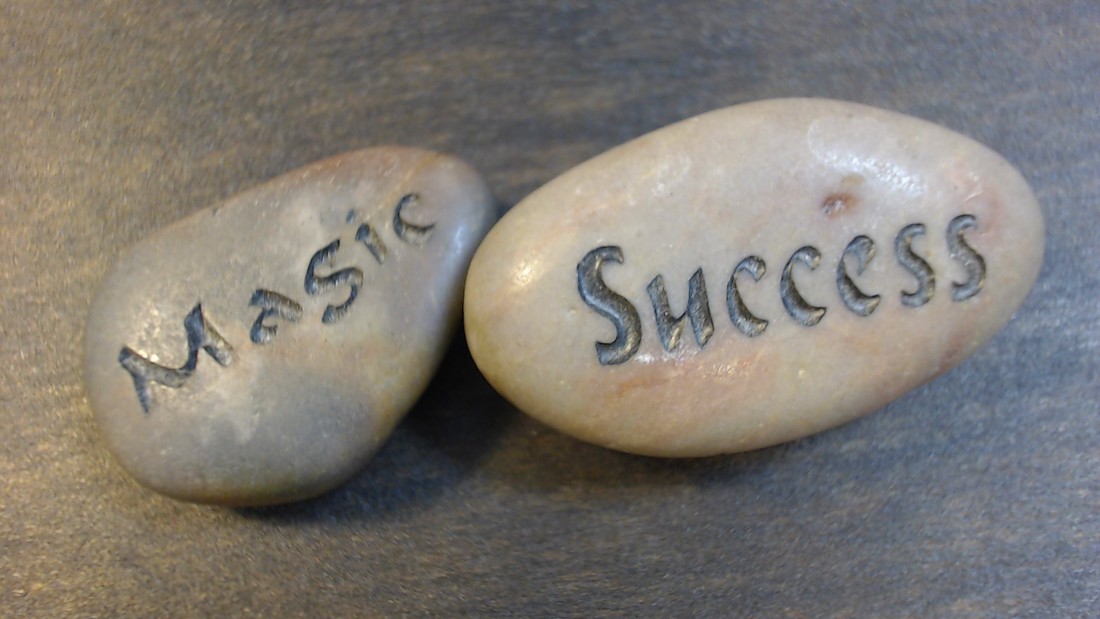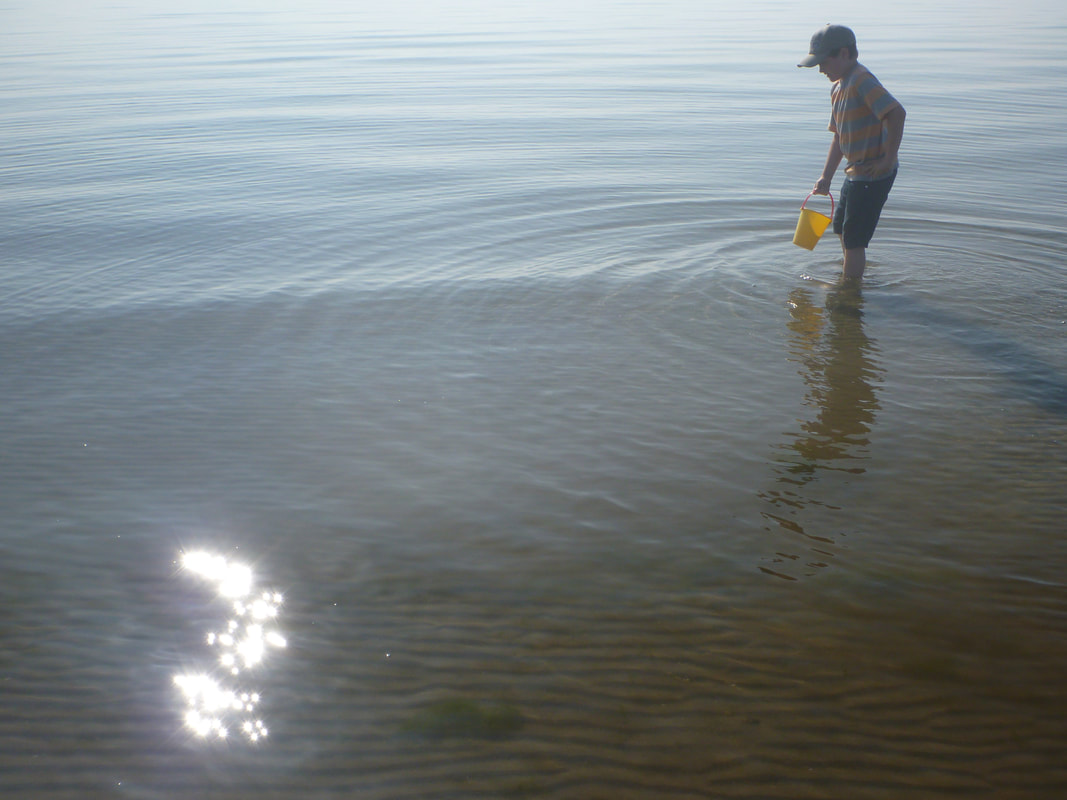The Thursday Thesis - 31/08/2017 I am a huge fan of self-help books – I’ve read or listened to hundreds of them since I gave up my glittering career as a teenage drunk – and I’ve noticed that they all have two big ideas in common. Since both ideas are super-important and interesting, I’m going to cover one this week and one next week. Firstly, there’s the theme of our will and the power to choose the changes we make in our lives: as Gandhi put it, to “be the change you wish to see in the world”. Call it self-mastery, success, or the secret – call it what you will – it all comes down to "The Science and Art of causing Change to occur in conformity with Will". That’s the thrust of what almost every self-help writer and guru preaches. But hold on a minute - that definition didn’t come from Tony Robbins, Jim Rohn or Napoleon Hill - it came from the English writer and occultist Aleister Crowley, as he explained what Magick is. By the way, Magick is the archaic spelling of the word – it’s not a typo – and since this is my blog, I’m going to flit from one spelling to another, so there! You’d be hard-pressed to find anyone in the self-help field who would disagree with that definition as a recipe for success. So, who was Aleister Crowley? Born in Leamington Spa in 1875, Crowley was the son of a successful brewing family who held Christian Fundamentalist beliefs. At Cambridge he captained the university chess team before dropping out to spend his fortune pursuing esoteric and occult knowledge, sex, drugs and adventures of every kind. In time, his infamous lifestyle earned him the title “The wickedest man in the World”, according to the British press, though he preferred to style himself The Beast 666. But he wasn’t just a sex-mad, drug-taking, bisexual, eccentric genius – though that would be enough for many of us. Crowley was also a journalist, novelist, poet, painter, ceremonial magician, mountaineer, and – quite possibly - a spy for the British government. Yet this libertine defined Magick in terms that closely resemble most modern day definitions of success - as extolled in thousands of self-help books, DVDs, online courses and 3-day “Ra-Ra” guru events in arenas all over the World. It’s interesting, isn't it? Every time you see someone who is exceptional at what they do you’ll notice the same thing: they make it look easy, effortless and completely natural... Almost like magic. Non-experts, like you and me, wonder how they do what they do, what their secret is, and how they make it look so easy. There is something magical and spellbinding about mastery and expertise, but it isn’t magic – it’s just technique and technology. “Any sufficiently advanced technology is indistinguishable from magic” wrote Arthur C. Clarke, the author of 2001: A Space Odyssey, many science fiction books and the inventor of the communication satellite. Our experts don’t have magic on their side – they have advanced technologies and techniques which we don’t have, yet. And the most important word in that sentence is “yet”. “Yet” tells us that we can acquire the skills and habits of experts, adopt their practices and become experts ourselves – “yet” implies that the skills are learnable and that we can learn them, sometime. Follow your “yet” with “but” and you’re really opening the door to change: say aloud “I don’t know how to do it, yet, but...” What else do you want to add to complete the sentence? If you said “I’m gonna” or “I will”, you’re going to learn how to do it, aren’t you? Words are powerful – perhaps even Magical. But there’s no magick to excellence: I ask you, is effective time management magic, weight loss mystical, or success in business esoteric? I don’t think so. And there's no Magic involved when you are learning to play guitar or any other musical instrument, either. Just find an expert guitar teacher, find out how they do it and do what they do. Not what they appear to do, but how they really do it, because if you learn how it’s really done, you know it’s not magic and you can do it, too. Neuro Linguistic Programming (NLP) tells us to model very specifically what experts do and how they think in order to perform just like they do. That sounds like learning to perform a ritual, doesn’t it? Next week we’ll look at the practical implementation of Magick into your everyday life and how to harness the power of Rituals. © Neil Cowmeadow 2017
Remember to Like and Share The Thursday ThoughtCast with your friends, family, and anyone else. I’d love to hear your comments, along with any ideas you’d care to hurl at me. [email protected]
2 Comments
The Thursday Thesis - 24/08/2017 How’s your day going, today? Are you having a good day or a bad day? Now ask yourself “why is this a good or bad day?” Chances are that you’ll credit the good day to something outside yourself: you’ll also blame the bad day on something outside of yourself, too. As a coach, teacher, and human being I have a massive problem with blaming or crediting circumstances for my happiness. Here’s why: happy and unhappy are states of mind. Your state of mind can’t be directly affected by anything external to you – the only connection between outside events and conditions is your interpretation of them. It’s obvious, when you stop to think about it, isn’t it? If the mind exists within our self then external factors cannot directly influence our state of mind because there is no unmediated connection between the external and the internal. And if circumstances are not the direct cause of happy or unhappy states of mind - our response to those external factors is. That’s why it’s so important to govern how we interpret what we hear, think, and believe – to protect us from reacting reflexively to events. I see it all the time in my guitar teaching sessions where it’s very common for students to unquestioningly recite other people’s opinions and preconceptions. They’ll often tell me “I have no talent” or “I’m not good at this”, or any other of the thousands of variations they’ve been given over the years. Their reflexive response is a compilation of other people’s opinions and throw-away remarks rather than the considered judgement of an expert guitarist or teacher. Letting that loop playback over and over again can go on for a lifetime, colouring every event and experience concerning (in this example) playing the guitar. For years – even decades – our response to circumstances and events gets handled by erroneous opinions of other people: we don’t even know that we are doing it – we “just know” we’re “untalented” or “no good at this”. It’s as though we’ve outsourced our responses to events. But that’s our job: nobody else can (or should) do it for us. That job is way too important to unwittingly handover to anyone else, ever. We are in control. When we learn to govern and control our reactions to external circumstances, we are in control of our mind, and thus our state of happiness or misery. And if we’re not in control, it becomes easy to imagine something outside of our self “triggering” us into an irrational state of mind. “Getting triggered” is a feeble justification – an excuse - and I’m not buying it. The bottom line is this: we always choose to be masters of circumstance or slaves to it. We always choose to be happy or unhappy. What are you choosing today? © Neil Cowmeadow 2017 Remember to Like and Share The Thursday Thesis with your friends, family, and anyone else. I’d love to hear your comments, along with any ideas you’d care to hurl at me. [email protected] The Thursday Thesis - 17/08/2017 Whenever you are thinking of a new goal or trying to achieve a little more, here’s a stupid-simple way to surprise yourself with a great idea. I call it the 20 Questions, and it involves (wait for it!) asking yourself twenty questions and writing down whatever comes to mind. But here’s the clever bit – every single one of the twenty questions is the same. How simple is that? So, let’s suppose that want to make more money... Ask yourself “what can I do to make more money, right now?” and write down your answer. How about stopping smoking? Ask yourself “what can I do instead of lighting a cigarette?” Now repeat the process. Keep going until you have your 20 answers. I promise you this: the first 10-12 answers will be obvious because the easy answers come first. The good stuff happens after about the 12th question, the target of 20 (or 30, or 40...) compels you to keep thinking, and this is where you begin to find creative answers. However crazy your answers become, don’t stop until you have your 20 answers. Genius lies just beyond crazy, in my opinion. Go and try it, right now – you know you want to, don’t you? And don’t stop at crazy. © Neil Cowmeadow 2017
Remember to Like and Share The Thursday Thesis with your friends, family, and anyone else. I’d love to hear your comments, along with any ideas you’d care to hurl at me. [email protected] The Thursday Thesis - 10/08/2017
It is always 99% easy. Yes, easy: the hard work, day in, day out, that produces the bulk of a project - that is the easy part. The problem is always that last 1%. At university the last 1% was submitting the assignments; today it is publishing a finished book or piece of music. You’d think it would be easy to just press the button and breathe, wouldn’t you? It isn’t easy - the fear contained in that last 1% can paralyse even the strongest person. But that last 1% is all that stands between the work and the audience: the people we wrote, composed, worked and dreamed for. In soccer, it’s the last 1% that makes all the difference. Between a goal and a miss, between winning and losing – that’s the 1%. If the ball never crosses the line – the game ends in a nil-nil draw: that’s all that gets written on the score-sheet. In life, it’s the 1% that sorts out the wannabes from the gonnabes; those who succeed and complete the job, and those who give up on the one-yard line. What’s the point in writing the world’s best novel, symphony, pop song or movie script if it sits, forever in your desk drawer or lurks in an obscure folder of your hard drive, unread, unheard, unsung and unseen? To paraphrase Oliver Wendell Holmes: “the tragedy of the average man is that he goes to his grave with his music still inside him”. The last 1% is the showdown between hope and fear. And fear fights to kill. Game on! © Neil Cowmeadow 2017 Please Like and Share The Thursday Thesis with your friends, family, your cat and anyone else. I’d love to hear your comments, along with any ideas you’d care to hurl at me. The Thursday Thesis - 2/8/2017
It’s that time of year again: when millions of us Brits pack our bags and head off for a week or two on our annual summer holiday. For some of us it’s a chance to bake our brains on the beach of a tropical paradise; for others it’s seeing the sights of one or other of the great cities of the world. Either of those holidays might appeal to you, or it might be something else again: we’re all different. But I’m not a fan. I don’t like lying on beaches, bar-hopping, playing golf every day or... well, just about anything that takes me away from teaching, learning and my work. Ok, I confess: I don’t like holidays very much – period. To me (and I’m not the only weirdo out there) there’s something odd about “escaping” from my work for a couple of weeks. This is one of the downsides of doing what you love for a living, and wanting to do it all the time. Now, I’m not sure if this is a problem. We’ll see. According to a recent survey, 84% of Brits don’t enjoy their job. That means that for 84% of the population, getting away from it all is a great idea: they’ve worked for it, they’ve earned it, and by golly they need it. And I still remember how it felt, when I was in the wrong job: my colleagues and I worked dutifully for most of the year in the jobs we didn’t enjoy in order to afford the things we wanted – including our hoidays abroad. At the time it didn’t strike me as odd: it’s what we did, and nobody challenged it. We planned our escapes for months, worked overtime to pay for it, and bitched about going back to work afterwards. But these days I have to be dragged, kicking and screaming to the airport. There’s something peculiar (at least to my addled brain) in absenting myself from my son, the work I love and the people I get to do it with, in order to do things I don’t enjoy anywhere near as much. Perhaps I’m odd, perhaps it just means that I am doing what I should be doing – perhaps I’m just a grumpy git who hates his routines being disrupted – who knows? I wish I’d known - I wish someone had told me - that when your work is your play, and your vocation feels like your vacation, you’ll never work a day in your life. Happy holidays! © Neil Cowmeadow 2017 |
Share it with your friends
It's Like This...The Thursday Thesis shares ideas which I think are worth spreading. Archives
May 2022
Categories
All
All content on these pages is the intellectual property of the author, unless otherwise stated, and may not be used in any form or reproduced under any circumstances without the authors permission.
|





 RSS Feed
RSS Feed